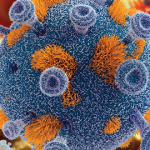Harnessing Effector Functions
Research using this knowledge is underway, said Margie Ackerman, PhD, professor of engineering at the Thayer School of Engineering at Dartmouth College. One aspect under investigation by her lab and others is the regulation of B cell/antibody effector functions for effective host defense.
Dr. Ackerman said it’s commonly known antibodies are the original, multi-specific proteins, linking the adaptive and innate immune systems by recognizing targeted antigens (hopefully intended) and pathogenic target antigens (but not always) with the innate immune arm of the immune system to clear pathogens. “So when antibodies aren’t binding to targets of interest, such as a pathogenic one, they’re doing all sorts of other things,” she said
One factor associated with variable effector function is glycosylation. Dr. Ackerman said, “Glycobiology is complex, it has its own language and it’s a non-templated process.” The complexity does not deter researchers. “We’re working to try and understand the collection of antibody types and how they relate to infectious disease outcomes. … Lots of measurements [are being made] to understand the spectrum of features and epitopes, antigen specificities, subclasses, glycosylation states and requisite functions, and how they relate to whether an individual is protected or experiences pathology.”
Dr. Ackerman has been involved in numerous studies in this area, including many related to HIV vaccines.4 One study she co-authored on non-human primates in 2017 found that an HIV-1 vaccine of recombinant poxvirus (ALVAC) and recombinant HIV-1 gp120 subtype B/subtype E (B/E) proteins demonstrated 31% vaccine efficacy.5
This was followed by a human study led by Scott Neidich, PhD, Duke University, Durham, N.C., on a preventative vaccine efficacy trial testing DNA followed by recombinant adenovirus serotype 5 (rAd5) in men.6 “An efficacious vaccine that provides durable immunity remains a key priority in the fight against HIV-1,” the researchers wrote.
Their goal, similar to Dr. Ackerman’s earlier research, was to test whether vaccine-elicited antibodies can recruit and activate innate immune effector cells. It did. “Data support a role for vaccine-elicited anti-HIV-1 Env IgG3, antibody engagement of Fc receptors and phagocytosis as potential mechanisms for HIV-1 prevention, ” the authors concluded.
Dr. Ackerman said these correlates hold predictive power for other vaccines and other immunization studies. “Antibody effector functions, binding to FcR and IgG glycosylation profiles can be key aspects of the humoral response, and are distinct from response magnitude,” she said.
“This opens up a lot of new doors,” Dr. Ackerman said. “We’re thinking of deploying these tools to other settings and binding them with how well the intersection of top-down and bottom-up data-rich studies fuel new basic insights that change our understanding of antibody-mediated protection and pathology in the next decade.”



